新概念英语第一册121-122课课件
合集下载
新概念第一册第121-122课精品课件

b. 在从句中担任句子成分:主语或宾语
c. 做连词,把主句和从句连接起来
I love singers who write music.
练习:判断who/that 在从句中担任主语还是宾语。
I
love singers who write their own songs
主语
He I I
is the man who I met yesterday.
5.当先行词同时包括人或物时。 We often talk about the people and the things that we are interested in. 6.当主句是who或which时。 Who is the girl that has black long hair? Which is the pen that you bought?
Look at the girl ____name is Lucy. A. who B. that C. who’s D. whose
只用that的情况
1.当序数词或形容词最高级修饰先行词时。
Tom is the cleverest boy that I have ever known.
6.Who is the girl _______is that standing under the tree?
3.当先行词被all, little, few,much,any,every,no 等修饰时 I have eaten all the food that is left. 4. 当先行词是There be 句型中的主语且指物 时。 There is little work that is fit for you. 没有什么工作适合你做。
新概念英语NCE1_lesson121-122(共27页)课件

• CUSTOMER: I bought two expensive dictionaries here half and hour ago, but I forgot to take them with me.
• MANAGER: Who served you, sir? • CUSTOMER: The lady who is standing behind the counter. • MANAGER: Which books did you buy? • CUSTOMER: The books which are on the counter. • MANAGER: Did you serve this gentleman half an hour ago,
邮件还没发) • ②I forget sending an email to him.(忘记已经发过
了,邮件已经发出了)
• 3.serve :[sə:v] v. • (1)服务;接待;侍候:
• Are you being served, sir? • 先生,有人为您服务吗?
• A young waiter served them. • 一位年轻的侍者侍候他们进餐。 • (2)供给;摆出(食物或饮料等):
• 2.put it on,戴上它。
• 这里的 it指 a hat,以避免重复。 put on是“戴上”、“穿上”的意思。 假如它的宾语是一个名词,这个名词 可放在 put on之后,也可放在put和on 之间。假如是代词,就必须放在put和 on 之间。如:
• Put on your coat./Put your coat on. 穿 上外衣。但只能说:Put it on. 把它穿 上。
• What time is breakfast served in this hotel? • 这个饭店里什么时候供给早餐?
Lesson121-122(课件)新概念英语第一册
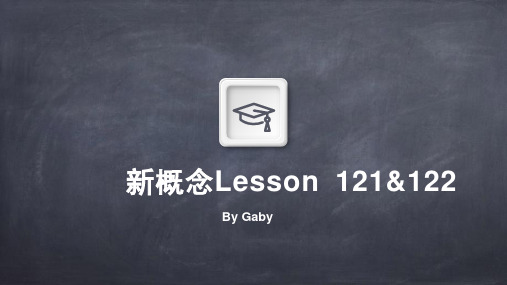
I recognize him now.
7. road [rəud] n.路 on the road 在路上 in the street 在大街上
1.The man in a hat (定语后置) in + 服装 ——穿着/ 戴着 in the white shirt - 穿着白衬衫 定语:“的” (修饰名词或者代词) a. 什么可以作定语:形容词: a pretty girl
1. customer ['kʌstəmə] n.顾客 sales assistant 销售员/ waiter 服务员 / waitress 女服务员 The customer is always right. 顾客至上
2. forget [fə'get] v.忘记 (forgot /fə'gɔt/, forgotten/fə'gɔtn/) forget to do sth 忘记要做...... e.g. I forget to finish my homework. (忘记做,还没做) forget doing sth 忘记已经做过...... e.g. I forget finishing my homework. (忘记已经做了,做过了。)
3. manager ['mænidʒə] n.经理 v. manage 管理 e.g. manage people 人事管理
4. serve [sə:v] v.照应,服务,接待 一位年轻的服务员侍候他们进餐。 A young waiter served them. n. service 服务 那家餐馆的服务很差。 The service in that restaurant is not good/bad/poor.
新概念Lesson 121&122
7. road [rəud] n.路 on the road 在路上 in the street 在大街上
1.The man in a hat (定语后置) in + 服装 ——穿着/ 戴着 in the white shirt - 穿着白衬衫 定语:“的” (修饰名词或者代词) a. 什么可以作定语:形容词: a pretty girl
1. customer ['kʌstəmə] n.顾客 sales assistant 销售员/ waiter 服务员 / waitress 女服务员 The customer is always right. 顾客至上
2. forget [fə'get] v.忘记 (forgot /fə'gɔt/, forgotten/fə'gɔtn/) forget to do sth 忘记要做...... e.g. I forget to finish my homework. (忘记做,还没做) forget doing sth 忘记已经做过...... e.g. I forget finishing my homework. (忘记已经做了,做过了。)
3. manager ['mænidʒə] n.经理 v. manage 管理 e.g. manage people 人事管理
4. serve [sə:v] v.照应,服务,接待 一位年轻的服务员侍候他们进餐。 A young waiter served them. n. service 服务 那家餐馆的服务很差。 The service in that restaurant is not good/bad/poor.
新概念Lesson 121&122
新概念英语第一册 Lesson121-122 (共28张PPT)

Yes, she is wearing a red blouse ___w_h_ic_h__suits her so much.
营业员和顾客 _s_h_o_p_a_s_si_s_ta_n_t_a_n_d_c_u_s_to_m__er___ regular customer __经_常__光_顾__的__客_人______
Vocabulary
(2). forget v. 忘记 (forget - _f_o_r_g_ot__ - _f_o_r_go_t_t_e_n_) 结构:forget to do sth. _忘__记_去__做__某_事__(还__没__做_)__
forget doing sth. _忘__记_做__过__某_事__(做__过_了__)__
e.g. I have forgotten _t_o_b_r_in_g__ my book.(bring) I will never forget __fi_n_d_in_g_ that rare coin in
你能开一下窗吗?
Sentences
put on 穿上,文中的it指代 ___衣_服__. 辨析:wear_穿_着__(_强_调__状_态__) V .S. put on _穿_上__(强__调__动_作__)
试一试:选词填空: I like to __w_e_a_r_ the hat every day. Please __pu_t_o_n_ your shoes. It is so untidy here.
定语从句练习:教材 P248 句型练习,注意连接词的运用
试一试 3: Neil and Yoyo are walking on the playground. They see many interesting people and things there.
营业员和顾客 _s_h_o_p_a_s_si_s_ta_n_t_a_n_d_c_u_s_to_m__er___ regular customer __经_常__光_顾__的__客_人______
Vocabulary
(2). forget v. 忘记 (forget - _f_o_r_g_ot__ - _f_o_r_go_t_t_e_n_) 结构:forget to do sth. _忘__记_去__做__某_事__(还__没__做_)__
forget doing sth. _忘__记_做__过__某_事__(做__过_了__)__
e.g. I have forgotten _t_o_b_r_in_g__ my book.(bring) I will never forget __fi_n_d_in_g_ that rare coin in
你能开一下窗吗?
Sentences
put on 穿上,文中的it指代 ___衣_服__. 辨析:wear_穿_着__(_强_调__状_态__) V .S. put on _穿_上__(强__调__动_作__)
试一试:选词填空: I like to __w_e_a_r_ the hat every day. Please __pu_t_o_n_ your shoes. It is so untidy here.
定语从句练习:教材 P248 句型练习,注意连接词的运用
试一试 3: Neil and Yoyo are walking on the playground. They see many interesting people and things there.
新概念英语第一册---121-122课(共47张PPT)(完整版)

Lesson 121
Revision: Lesson119 A true story Key words&expressions
• story
n.
• happen
v.
• thief
n.
• enter
v.
• dark
adj.
• torch
n.
• voice
n.
• parrot
n.
• exercise book n.
❖ Find the differences as more as you can!
video
Key words&expressions
Key words&expressions
❖ customer ❖ forget ❖ manager ❖ serve
❖ counter ❖ recognize
n. 顾客 v. 忘记 n. 经理 v. 照应,服务,
接待 n. 柜台 v. 认出
Key words&expressions
1. customer ['kʌstəmə] n. 顾客
❖ custom 风俗 ❖ customs 海关 ❖ 有顾客customer的地方,肯定就有
shop assistant /waiter/waitress ❖ guest 旅馆的旅客 ❖ passenger 乘客 ❖ a regular customer 老顾客 ❖ 顾客至上 Customer is god.
Key words&expressions
5.counter ['kauntə] n. 柜台 ❖ at the jewelry counter
在珠宝部
❖ checkout counter
Revision: Lesson119 A true story Key words&expressions
• story
n.
• happen
v.
• thief
n.
• enter
v.
• dark
adj.
• torch
n.
• voice
n.
• parrot
n.
• exercise book n.
❖ Find the differences as more as you can!
video
Key words&expressions
Key words&expressions
❖ customer ❖ forget ❖ manager ❖ serve
❖ counter ❖ recognize
n. 顾客 v. 忘记 n. 经理 v. 照应,服务,
接待 n. 柜台 v. 认出
Key words&expressions
1. customer ['kʌstəmə] n. 顾客
❖ custom 风俗 ❖ customs 海关 ❖ 有顾客customer的地方,肯定就有
shop assistant /waiter/waitress ❖ guest 旅馆的旅客 ❖ passenger 乘客 ❖ a regular customer 老顾客 ❖ 顾客至上 Customer is god.
Key words&expressions
5.counter ['kauntə] n. 柜台 ❖ at the jewelry counter
在珠宝部
❖ checkout counter
新概念英语课件第一册第121课NCE1Lesson121,122

The man in a hat
CUSTOMER: I bought two expensive dictionaries here half and hour ago, but I forgot to take them with me. MANAGER: Who served you, sir? CUSTOMER:The lady who is standing behind the counter. MANAGER: Which books did you buy? CUSTOMER:The books which are on the counter. MANAGER: Did you serve this gentleman half an hour ago, Caroline? He says he's the man who boughr
customer
road for get forget
忘记就是为了得到。 manage r manager
serve
re
cog
nize(无意义)
recognize
吻合,一致
又吻合了,所以我才认出来。
Unit 61
1
3
2
4
•
Don’t forget to lock the door.
CAROLINE: I can't remember. The man who I served was wearing a hat. MANAGER: Have you got a hat, sir? CUSTOMER:Yes, I have. MANAGER: Would you put it on, please? CUSTOMER:All right. MANAGER: Is this the man that you served, Caroline? CAROLINE: Yes. I recognize him now.
新概念英语NCE1_lesson121-122(共51页)课件

表示对现在的猜测和推断: He can’t be shaving. He must be having a bath. 。 表示对过去的猜测和推断,用must have been表示肯定的推断, 用can’t have been来表示否定的推断, She can’t have been 29. She must have been 36.
③ v. 指挥;指责 They charged her with murder.
Question
What does Ann advise her husband to do next time?
数阅
学读
使使
人人
精充
细实
;;
博会
物谈
使使
人人
深敏
沉捷
;;
You made my day!
伦 理 使 人 庄 重 ; 逻 辑 与 修 辞 使 人 善 辩 。
如后面跟进行时则表示对过去正在进行的动作的猜测。 He can’t have been reading. He must have been sleeping.
Question
Who is only twenty-nine, and why is it so unclear?
Lesson 129 Seventy miles an hour
Question Does Susan have tea by herself?
Lesson 127 A famous actress
famous fame n. ① adj. 著名的;出名的
She’s a very famous actress. be famous for
She is famous for her beauty. be famous as
③ v. 指挥;指责 They charged her with murder.
Question
What does Ann advise her husband to do next time?
数阅
学读
使使
人人
精充
细实
;;
博会
物谈
使使
人人
深敏
沉捷
;;
You made my day!
伦 理 使 人 庄 重 ; 逻 辑 与 修 辞 使 人 善 辩 。
如后面跟进行时则表示对过去正在进行的动作的猜测。 He can’t have been reading. He must have been sleeping.
Question
Who is only twenty-nine, and why is it so unclear?
Lesson 129 Seventy miles an hour
Question Does Susan have tea by herself?
Lesson 127 A famous actress
famous fame n. ① adj. 著名的;出名的
She’s a very famous actress. be famous for
She is famous for her beauty. be famous as
新概念英语NCE1_lesson121-122(共34页)课件

Grammar
定语从句(The Attributive Clause)
限制性定语从句 (由关系代词引导的) 1. who,whom
指人,分别作主语和宾语。
The foreigner who visited our class yesterday is from Canada. Who is the person (whom)you just talk to.
Grammar
定语从句(The Attribut来自ve Clause)定义: 在复合句中修饰某一个名词或者代词的从句
The man who lives next to us sells vegetables.
先行词
定语从句
You must do everything that I do.
先行词
customer forget
manager serve
manager
n. 经理
a sales manager 销售经理
manager manage a firm
v. 管理 经营公司
manager
v. 设法(成功)做到,处理
e.g. A: Can I help with your luggage? 我能帮你拿行李吗?
manager serve
customer client guest passenger
n. 顾客(买东西的顾客) 银行,律师等的客户 旅馆的旅客 乘客
a regular customer 老顾客
e.g. The customer is always right. 顾客至上。
customer forget
e.g. Serve him right. = It serves him right!
新概念英语NCE1_lesson121-122(共19页)课件
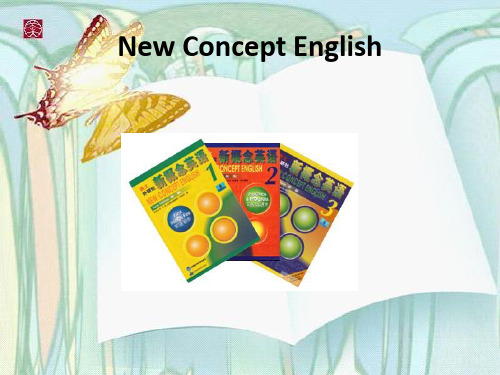
• customer n. 顾客(买东西的顾客) • client 银行,律师等的客户 • guest 旅馆的旅客 • passenger 乘客 • a regular customer 老顾客 • 顾客至上。
• The customer is always right.
• --forget v. • 1) 忘记 • 我忘了他的电话号码。
• recognize v. • 1) 认出 • 你能认出他的笔迹吗?
• Do you recognize his handwriting? • 2)承认(事实),认清,确认 • 我们都肯定她在舞蹈方面有才华。
ቤተ መጻሕፍቲ ባይዱ• We all recognized her talent for dancing.
• 他不承认自己犯下了大错。
• She forgot to mail the letter.
• 2) 忘记事 • --I forgot my umbrella. 我忘了带伞。 • 他将伞忘在火车上。 • He forgot his umbrella on the train, • = He left his umbrella on the train.
• Serve him right.= It serves him right!
• service n. • 那家餐馆的服务很差。
• The service in that restaurant is poor. • a charge for service 服务费
• counter n. 柜台 • 在珠宝部 • at the jewelry counter • 付帐柜台 • checkout counter
•9、阅读使人充实,会谈使人敏捷,写作与笔记使人精确……史鉴使人明智;诗歌使人巧慧2021/9/252021/9/25Saturday, September 25, 2021 •10、每一本书是一级小阶梯,我每爬上一级,就更脱离畜生而上升到人类,更接近美好生活的观念,更热爱书籍。2021/9/252021/9/252021/9/259/25/2021 8:48:32 PM •11、书是人类进步的阶梯,终生的伴侣,最诚挚的朋友。2021/9/252021/9/252021/9/25Sep-2125-Sep-21 •12、阅读一本不适合自己阅读的书,比不阅读还要坏。我们必须会这样一种本领,选择最有价值、最适合自己所需要的读物。2021/9/252021/9/252021/9/25Saturday, September 25, 2021 13、He who seize the right moment, is the right man.谁把握机遇,谁就心想事成。2021/9/252021/9/252021/9/252021/9/259/25/2021 •14、谁要是自己还没有发展培养和教育好,他就不能发展培养和教育别人。2021年9月25日星期六2021/9/252021/9/252021/9/25 •15、一个爱书的人,他必定不致缺少一个忠实的朋友,一个良好的老师,一个可爱的伴侣,一个优婉的安慰者。2021年9月2021/9/252021/9/252021/9/259/25/2021 •16、提出一个问题往往比解决一个更重要。因为解决问题也许仅是一个数学上或实验上的技能而已,而提出新的问题,却需要有创造性的想像力,而且标志着科学的真正进步。 2021/9/252021/9/25September 25, 2021 •17、看文字须大段精彩看,耸起精神,竖起筋骨,不要困,如有刀剑在后一般。就一段中须要透;击其首则尾应,击其尾则首应,方始是。不可按册子便在,掩了册子便忘。 2021/9/252021/9/252021/9/252021/9/25
新概念英语第一册第121-122课课件.ppt
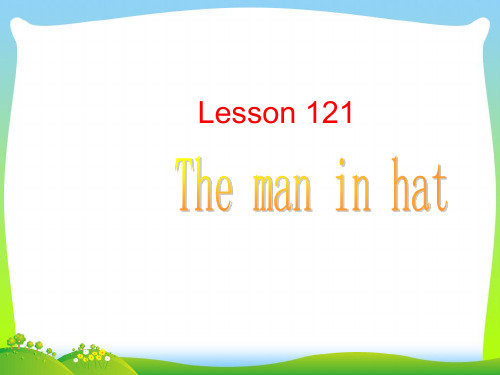
了。 ❖ He began to serve in the Navy in 1960. 他从1960年起开始在海军服役
❖ serve the people heart and soul ❖ 全心全意地为人民服务
❖ Make the past serve the present and foreign things serve China. ❖ 古为今用, 洋为中用。
❖ account customer立有存款帐的顾主 ❖ cash customer现金交易客户 ❖ charge customer赊销顾客 ❖ credit customers赊户, 信用顾客 ❖ regular customer 老主雇 ❖ a queer customer怪人 ❖ a tough customer 粗暴的[难对付的]家伙,
⑸
⑷ ⑴
⑶
⑵
Language points
later
dictionary
1. I bought two expensive dictionaries here half
ห้องสมุดไป่ตู้
an hour ago, but I forgot to take them with me.
❖ take sth with sb 把某物带走 我去那个村庄的时候我随身带了一些药。
1. Customer ['kʌstəmə] n. 顾客
❖ custom 风俗 ❖ customs 海关 ❖ 有顾客customer的地方,肯定就有 shop
assistant /waiter/waitress ❖ guest 旅馆的旅客 ❖ passenger 乘客 ❖ a regular customer 老顾客 ❖ 顾客至上 Customer is god.
❖ serve the people heart and soul ❖ 全心全意地为人民服务
❖ Make the past serve the present and foreign things serve China. ❖ 古为今用, 洋为中用。
❖ account customer立有存款帐的顾主 ❖ cash customer现金交易客户 ❖ charge customer赊销顾客 ❖ credit customers赊户, 信用顾客 ❖ regular customer 老主雇 ❖ a queer customer怪人 ❖ a tough customer 粗暴的[难对付的]家伙,
⑸
⑷ ⑴
⑶
⑵
Language points
later
dictionary
1. I bought two expensive dictionaries here half
ห้องสมุดไป่ตู้
an hour ago, but I forgot to take them with me.
❖ take sth with sb 把某物带走 我去那个村庄的时候我随身带了一些药。
1. Customer ['kʌstəmə] n. 顾客
❖ custom 风俗 ❖ customs 海关 ❖ 有顾客customer的地方,肯定就有 shop
assistant /waiter/waitress ❖ guest 旅馆的旅客 ❖ passenger 乘客 ❖ a regular customer 老顾客 ❖ 顾客至上 Customer is god.
新概念英语NCE1_lesson121-122-2课件
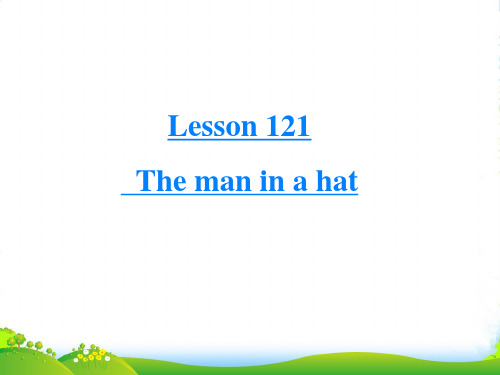
CUSTOMER: I bought two expensive dictionaries here half and hour ago, but I forgot to take them with me.
MANAGER: Who served you, sir? CUSTOMER: The lady who is standing behind the counter. MANAGER: Which books did you buy? CUSTOMER: The books which are on the counter. MANAGER: Did you serve this gentleman half an hour ago, Caroline?
Serve it to the ladies first. 把它先端给女士们。 (3)为……服务/服役;任职: The old cook has served the family for 30 years. 这位老厨师已为这家干了30年了。 He began to serve in the Navy in 1960. 他从1960年起开始在海军服役。
Lesson 121 The man in a hat
New words and expressions
1. Customer ['kʌstəmə] n. 顾客 custom 风俗 customs 海关 有顾客customer的地方,肯定就有shop assistant
/waiter/waitress Customer is god.
He says he's the man who bought these books. CAROLINE: I can't remember. The man who I served was wearing a
新概念第一册 Lesson121-122(共24张PPT)

which. that 用来指物
用作主语、宾语,作宾语时可以省略,例如: ①The cups (which / that) are on the shelf are pretty. (which / that在从句中作主语) ②He has found the key (which / that) he lost yesterday. (which / that在从句中作宾语)
定义:在复合句中修饰名词和代词的从句叫做定语从句。 被定语从句修饰的名词或代词是先行词。 定语从句必须放在先行词之后。 定语从句要由关联词:关系代词who, whom, that,which或关系 副词when, where等引导。 eg:The student who answered the question was peter.
Homework
COVID-19
少出门 多通风 勤洗手 戴口罩
1. To finish the exercises after the text. 2. To practise the structures learned during the class.
Language focus
4. Would you put it on, please? All right. Would you ... please? 表示提出客气的请求,相同表达方式还包括: Could you ... please? eg:Would you open the window, please? All right = OK. 表示“好吧,行”也可表示(身体)好,无恙 That's all right. “没有关系”,用于回答sorry That's all. “就这些了” That's right. “对了,说得对”
新概念英语第一册Lesson-121-122(共26张PPT)
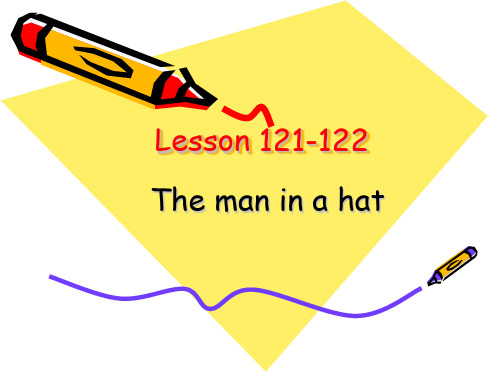
Manager: Did you serve this gentleman half an hour ago, Caroline?He says he’s the man who bought these books.
Caroline: I can’t remember. The man who I served was wearing a hat.
served, Caroline? Caroline: Yes. I recognize him now.
expensive adj.
costly ,dear e.g. He bought his wife a costly
diamond necklace. That is a dear shop.
Manager: Have you got a hat, sir? Customer: Yes, I have. Manager: Would you put it on, please? Customer: All right. Manager: Is this the man that you
wear v.
wear a brace on her teeth 戴牙套
wear a strange pair of shoes wear a hat to guard your face against the
sun
Important phrases
forget to do something 忘记要做某事
antecedent 先行词
• 被定语从句修饰的名词、代词称为先行 词。如“The man”、“The book”。 如“那个穿着西装的人是我爸爸”这就 是一个定语从句。
• The man who wears the suit is my dad.
新概念一Lesson121-122The man in a hat ppt课件
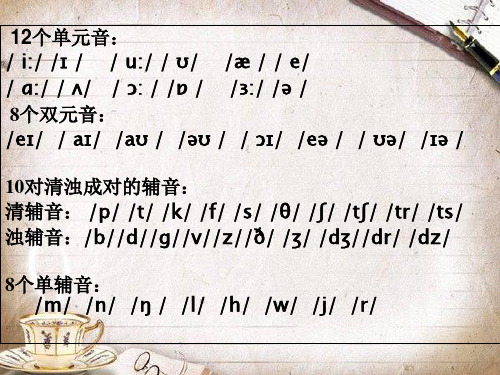
主谓 宾
(是一个完整的句子)
定
例如: This is the man who came here last week. 引导词:who(指人。主语) 被修饰词:the man 翻译:这就是上周来这儿的那个人。
This is the book which I bought yesterday. 引导词: which(指物) 被修饰词:the book 翻译:这就是我昨天买的书。
Heaven helps those who help themselves.
天助自助者。
Lesson121 戴帽子的男士
CUSTOMER: 我买了两本很贵的字典 (expensive dictionaries )--在这里 -半小时前(half an hour ago), 但是我 忘记(forgot to )把他们拿走了。
ago, but I forgot to take them with me.
MANGER: Who served you, sir?
CUSTOMER: The lady who is standing behind the counter.
MANGER: Which books did you buy? CUSTOMER: The books which are on
MANGER: 谁接待您的,先生?
Heaven helps those who help themselves.
天助自助者。
Hale Waihona Puke CUSTOMER: 那个女士-- 站在柜台后 的那位.
MANGER: 您买的是什么书? CUSTOMER: 就是柜台上的两本书。
Heaven helps those who help themselves.
新概念英语第一册课件Lesson121-122
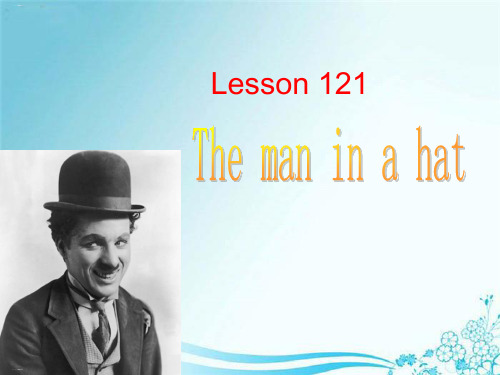
6.recognize ['rekəɡnaiz] v. ❖ (1)认出;熟悉:
I recognize him now. 我现在认出他来了。 ❖ recognize an old acquaintance 认出一位老相识 ❖ refuse to recognize sb. any longer 不再理睬某人 ❖ recognize one's duty 认清自己的职责
接待 n. 柜台 v. 认出
Key words&expressions
1. customer ['kʌstəmə] n. 顾客
❖ custom 风俗 ❖ customs 海关 ❖ 有顾客customer的地方,肯定就有 shop
assistant /waiter/waitress ❖ guest 旅馆的旅客 ❖ passenger 乘客
❖ counter ❖ recognize
n. 顾客 v. 忘记 n. 经理 v. 照应,服务,
接待 n. 柜台 v. 认出
Key words&expressions
❖ customer ❖ forget ❖ manager ❖ serve
❖ counter ❖ recognize
n. 顾客 v. 忘记 n. 经理 v. 照应,服务,
❖ ② v. 供应;摆出(食物或饮料等) ❖ What time is breakfast served in this hotel?
❖ ③ v. 为……服务/服役;任职 ❖ The old cook has served the family for 30 years.
❖ serve the people heart and soul
❖ (2)承认;确认: ❖ recognize this new government 承认这个新政府
I recognize him now. 我现在认出他来了。 ❖ recognize an old acquaintance 认出一位老相识 ❖ refuse to recognize sb. any longer 不再理睬某人 ❖ recognize one's duty 认清自己的职责
接待 n. 柜台 v. 认出
Key words&expressions
1. customer ['kʌstəmə] n. 顾客
❖ custom 风俗 ❖ customs 海关 ❖ 有顾客customer的地方,肯定就有 shop
assistant /waiter/waitress ❖ guest 旅馆的旅客 ❖ passenger 乘客
❖ counter ❖ recognize
n. 顾客 v. 忘记 n. 经理 v. 照应,服务,
接待 n. 柜台 v. 认出
Key words&expressions
❖ customer ❖ forget ❖ manager ❖ serve
❖ counter ❖ recognize
n. 顾客 v. 忘记 n. 经理 v. 照应,服务,
❖ ② v. 供应;摆出(食物或饮料等) ❖ What time is breakfast served in this hotel?
❖ ③ v. 为……服务/服役;任职 ❖ The old cook has served the family for 30 years.
❖ serve the people heart and soul
❖ (2)承认;确认: ❖ recognize this new government 承认这个新政府
- 1、下载文档前请自行甄别文档内容的完整性,平台不提供额外的编辑、内容补充、找答案等附加服务。
- 2、"仅部分预览"的文档,不可在线预览部分如存在完整性等问题,可反馈申请退款(可完整预览的文档不适用该条件!)。
- 3、如文档侵犯您的权益,请联系客服反馈,我们会尽快为您处理(人工客服工作时间:9:00-18:30)。
manager n. 经理 销售经理 sales manager 总经理 General Manager 他是我们的经理 He is our manager. manage v. 管理 经营公司 manage a company
• • • • • • • • • • •
serve v. 照应,服务,接待 一位年轻的侍者侍候他们进餐 A young waiter served them. serve sb right (口语) 给某人应得的报应(惩罚) 他活该 Serve him right.= It serves him right! service n. 那家餐馆的服务很差。 The service in that restaurant is poor. a charge for service 服务费
课文讲解
• I bought two expensive dictionaries here half an hour ago, but I forgot to take them with me. • half an hour ago 半小时之前(用在过去时当中) • hour 是以元音音素开头字母,前面的不定冠 词用“an” • forget to do 表示忘记去做某事 • 昨天我忘记了要给你打电话。 • I forgot to call you yesterday. • 下次别忘了把你的书带来。 • Don’t forget to bring your book here next time.
• • • • • • • • • • • •
--forget v. 1) 忘记 我忘了他的电话号码。 I forget his telephone number. forget doing 忘记曾做过 我永远忘不了在纽约见到他。 I’ll never forget seeing him in New York. forget to do 忘记去做 别忘了打电话给我。 Don’t forget to call me. 她忘了寄信 She forgot to mail the letter.
• • • • •
2) 忘记事 --I forgot my umbrella. 我忘了带伞。 他将伞忘在火车上。 He forgot his umbrella on the train, = He left his umbrella on the train.
• • • • • • • • • •
Lesson 121 The man in a hat
单词学习
• • • • • • customer forget manager serve counter recognize n. 顾客 v. 忘记 n. 经理 v. 照应,服务,接待 n. 柜台 客(买东西的顾客) client 银行,律师等的客户 guest 旅馆的旅客 passenger 乘客 a regular customer 老顾客 顾客至上。 The customer is always right.
• • • • • • • • •
I can’t remember. The man who I served was wearing a hat. wear 穿(表示状态) put on 穿上(强调动作) Have you got a hat, sir? Yes, I have. Would you put it on, please? All right. Would you…? 请你…好吗?
定语从句
• 定义:在复合句中修饰名词和代词的从句 叫做定语从句。
• 被定语从句修饰的名词或代词是先行词。 定语从句必须放在先行词之后。 • The student who answered the question was peter. • 回答问题的那个学生叫Peter.
• 用作关联词的关系代词有who, whom, whose, that, which 等。 • A child whose parents are dead is called an orphan. • 失去父母的孩子叫做孤儿。 • 我想要一个有大窗户的房间。 • I’d like a room whose window is big. • 用铅笔写的信很难读 • A letter that is written in pencil is difficult to read.
• bring sth with sb 把某物带来 • 如果你下次再不把书带来,我就给你父亲 打电话。 • Peter, if you don’t bring your book with you next time, I’ll call your father. Peter, • bring sb sth = bring sth to sb • 把某物带给某人 • 谢谢你给我带来你的照片。 • Thank you for bring me your pictures.
• take sth with sb 把某物带走 • 我去那个村庄的时候我随身带了一些药。 • I took some medicine with me when I went to the village. • take sb sth = take sth to sb • 把某物拿去给某人 • 我将给我在北京的朋友们带一些礼物。 • I’ll take some presents to my friends in Beijing. • = I’ll take my friends in Beijing some presents.
• • • •
Which books did you buy? which 指在一定范围内的哪个(些) which 既可用来指人,又可用来指物 Did you serve this gentleman half an hour ago, Caroline? • He says he’s the man who bought these books.
• Is this the man that you served. Caroline? • Yes, I recognize him now.
• • • • • • •
Who served you, sir? The lady who is standing behind the counter. served是serve的过去式,“服务” 我会全心全意为人民服务的。 I’ll serve the people with heart and soul. 这不喜欢站在门口的那个男人。 I don’t like that man who is standing by the gate.
• • • • •
counter n. 柜台 在珠宝部 at the jewelry counter 付帐柜台 checkout counter
• • • • • • •
recognize v. 1) 认出 你能认出他的笔迹吗? Do you recognize his handwriting? 2)承认(事实),认清,确认 我们都肯定她在舞蹈方面有才华。 We all recognized her talent for dancing. • 他不承认自己犯下了大错。 • He didn’t recognize that he had made a big mistake.
